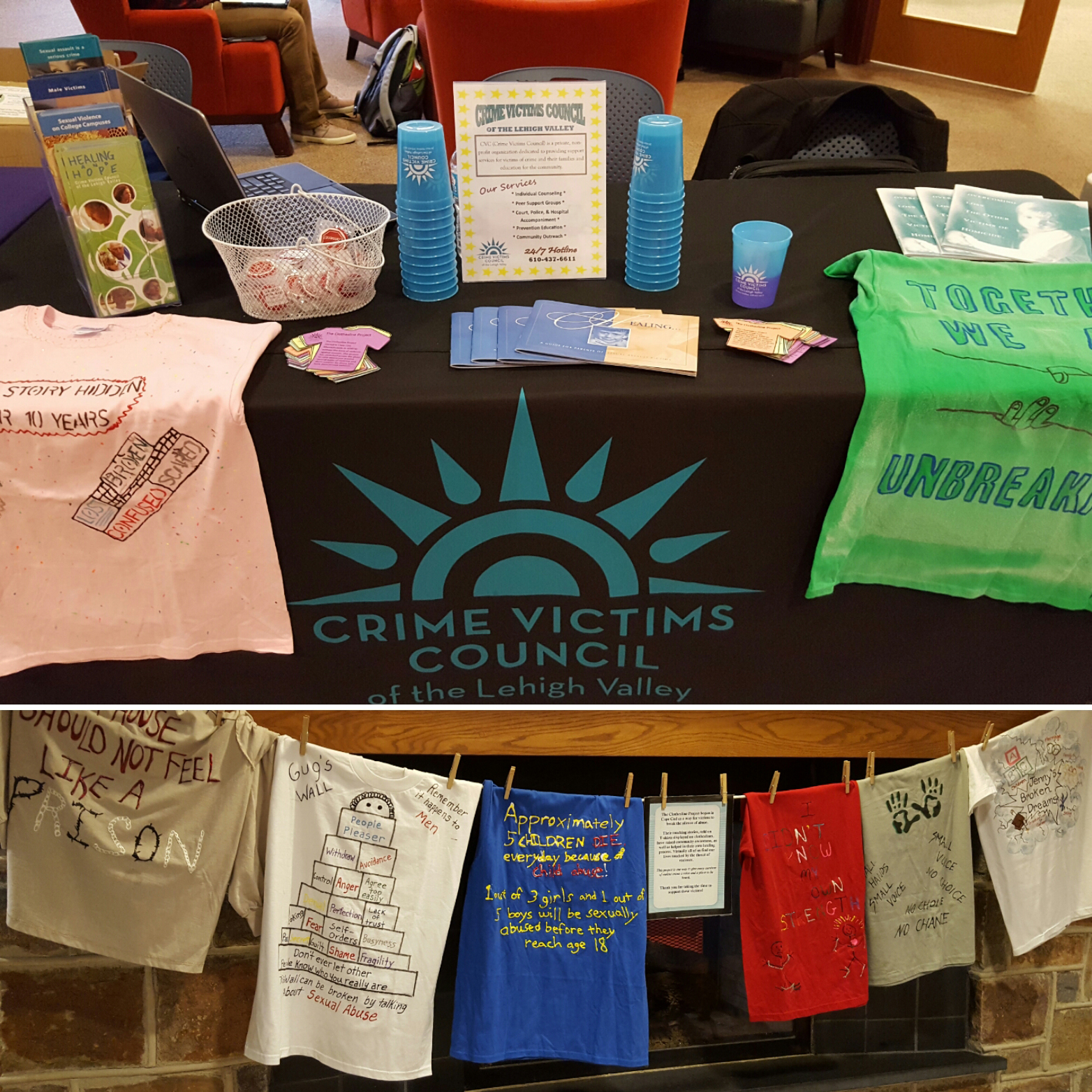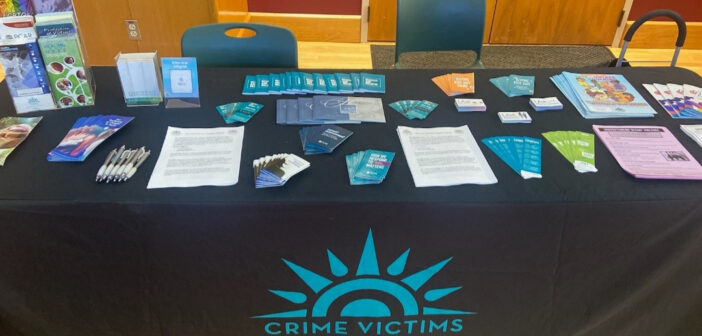Editor’s note: This article includes discussion of sexual violence. If you have experienced or are experiencing sexual abuse, contact the National Sexual Assault Online Hotline.
Sexual assault remains an alarmingly common crime on college campuses. College cases are statistically heightened during the “Red Zone” time span.
According to the MeToo Movement website, the Red Zone begins when students first arrive on campus and ends at the end of November.

The Crime Victims Council of Lehigh Valley holds events for students with resources to report sexual violence. The council offers a free 24 hour hotline with counseling, advocacy, accompaniment and community education. (Cait Hall/B&W Staff)
Emily Grigonis, supervisor of community outreach and educational programming for the Crime Victims Council of the Lehigh Valley, said the Red Zone is the highest risk and vulnerability period for any sexual violence on a college campus.
Grigonis said the council works with Lehigh to help host events and raise awareness for sexual violence during orientation and throughout the academic year.
Lehigh has been one of the Crime Victim Council’s longest and strongest partnerships since Grigonis started working there, she said. Along with the sexual violence session during orientation, the council also offers 5×10 programs about consent and rape culture.
Grigonis said sexual violence happens far too often, even before an individual reaches the age of 18.
“The dynamic of sexual assault is about power, control and trust,” Grigonis said. “You don’t necessarily have the Red Zone safety guide in your head when you’re with friends or people that you feel comfortable with because you don’t think that you need it, and something could end up happening.”
Grigonis said if her organization could get any amount of information about awareness resources and reporting options to students — at both Lehigh and other college campuses — students could then pass it on to help others.
The Gender Violence Education & Support Office on campus is designed to be the support space for survivors on campus, providing them with resources for reporting sexual assault cases.
Brooke DeSipio, the office’s assistant dean and director said the office provides support for students 24/7.
“When the office isn’t open, we have gender violence support advocates that are on call,” DeSipio said. “There’s always someone available to talk to and walk students through their reporting and resource options.”
Another on-campus resource is the Gender Violence Support Advocates, which supports survivors of any kind of gender violence. The Advocates are a group of Lehigh staff members who are trained by the Crime Victims Council.
“Advocates can go with students to meet with the police, the Title IX coordinator, help them set up counseling sessions and even drive them to the hospital if they need a forensics evidence exam,” DeSipio said.
Students themselves can report instances of sexual violence in several ways, including filing a report through LUPD or through the university via Title IX.
DeSipio said she encourages students to file a report through LUPD if they are feeling unsafe for any reason.
“It’s important for students to know that anyone who works for the university is required to make a report if the student discloses some kind of sexual misconduct,” DeSipio said. “Staff can help students get connected with resources by filling out an online reporting form through our office as well.”
The GVES offers support not just for survivors of sexual violence, but for anyone who is being impacted or struggling, DeSipio said. She said if someone’s partner, friend or sibling was assaulted, the office is there to help them, too.
DeSipio said she wants survivors to know they aren’t alone and that there is a space on campus dedicated to students. She hopes the office is making an impact in terms of prevention, and that they’re giving students the skills to help them feel empowered about their sexuality.
“If students need help emotionally or need to talk, please reach out to us because survivors shouldn’t and don’t have to go through this alone,” DeSipio said. “Working with counseling will help students develop coping mechanisms because it’s not a sequential process but rather a journey you face throughout your life.”
Lehigh University Police Chief and Assistant Vice President of Campus Safety Jason Schiffer said college is a critical time for students. There are a lot of changes going on in their lives, and for many students, it’s the most freedom they’ve experienced, he said.
Schiffer said this freedom and change is why LUPD has a responsibility to educate students about the Red Zone.
“Let’s remember that this isn’t a situation where we make it to Thanksgiving break and forget about sexual violence because those situations present themselves throughout college,” Schiffer said.
Schiffer said although first-year students are the traditional group that the Red Zone informational programming is directed towards, all students are at risk during this time frame.
HawkWatch, a personal safety app designed to keep the campus community aware of emergencies and campus resources, also keeps students informed about instances of sexual violence.
“LUPD is required to post alerts on HawkWatch under the Clery Act for different crimes, but sometimes it has the unintended effect of re-traumatizing the individual involved or other students,” Schiffer said.
Schiffer said LUPD has reduced the number of notifications for crimes on and around campus to avoid causing extra stress for students. Schiffer said students still receive push notifications but they’re not as frequent as they were in the past.
The Clery Act also requires LUPD to publish a crime log, which Schiffer said is accessible online if students want to know what’s happening on or near campus.
“The motto of HawkWatch is, ‘We look out for each other,’” Schiffer said. “And that was intentional when we adopted this program. We want to build a community at Lehigh that looks out for one another and helps keep each other safe at all times.”
DeSipio said students are survivors beyond Lehigh, and if they get the support they need now, they can integrate the coping mechanisms and advice they learned into their lives moving forward.
“We are encouraging students to report and seek help because Lehigh is not a place where we tolerate students causing harm to one another,” DeSipio said. “Creating a survivor-supportive environment is very important, and I hope that’s what we’re doing.”






Comment policy
Comments posted to The Brown and White website are reviewed by a moderator before being approved. Incendiary speech or harassing language, including comments targeted at individuals, may be deemed unacceptable and not published. Spam and other soliciting will also be declined.
The Brown and White also reserves the right to not publish entirely anonymous comments.